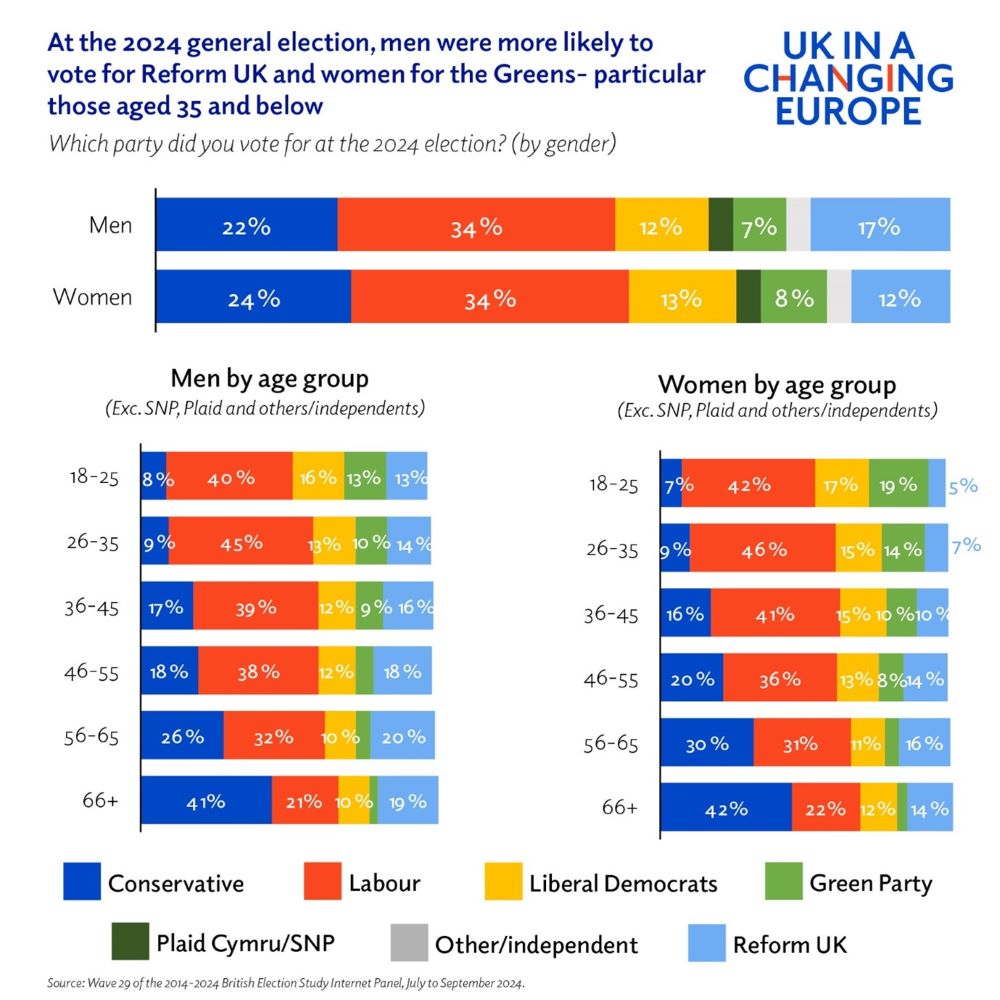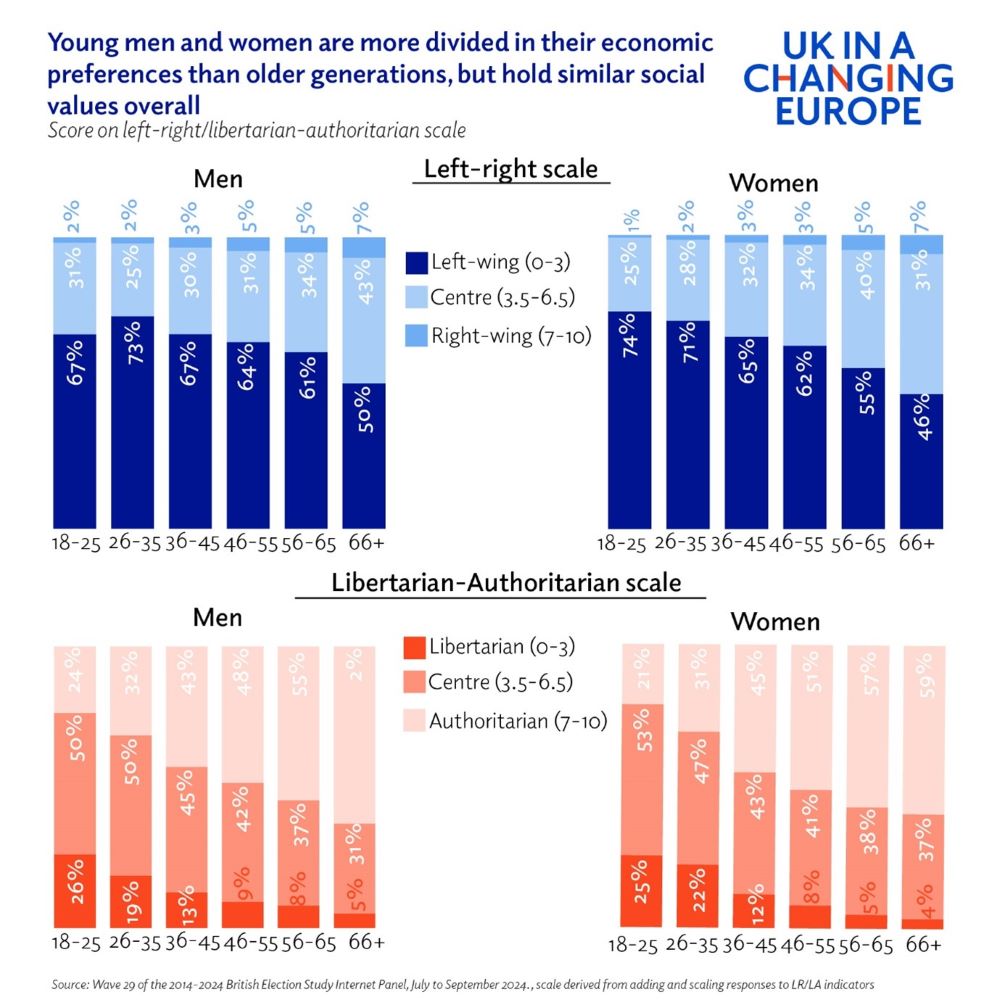Why are young women so unlikely to support Reform?
6 min read
Why young men seem to be drifting towards Reform has been a major talking point in recent weeks. But less attention has been paid to the role young women are playing in changing voting patterns.
In elections across the world, from South Korea to Poland, to the US and indeed the UK, one thing has been clear: young men and women are moving in different political directions.
But while much has been said about disenchanted young men and their electoral preferences, far less has been said and written about young women. But they are an important part of the polarisation we are seeing in many places among young Britons.
In July 2024, the electoral gender gap was at its widest among the UK’s youngest voters, with the difference in their likelihood of men and women voting for Reform or the Greens in July larger in the 18-24 age bracket than any other.

Many have been moved to explain what is happening in terms of young men. Research shows increased scepticism among young male voters toward progressive politics — things like anti-discrimination policy or gender equality. This cynicism can be channelled not just into support for figures like self-proclaimed misogynist Andrew Tate, but parties of the right.
Data from the US and beyond also shows that young men are increasingly pessimistic not just about their own prospects, but of men overall. Many are confused about their place in society in an age where women are increasingly likely to be breadwinners and male unemployment is rising. Young American men are increasingly likely to say they feel discriminated against and ignored by wider society, including politics.
In turn, online communities which take young men's concerns of social isolation seriously, and which are scathing of ‘wokeness’ and ideas like gender equality, become increasingly attractive. Many of these networks have links to and channel them toward the political right- the US ‘manosphere’ emphatically endorsed Donald Trump just last month.
It's an idea that has travelled across the Atlantic to the UK. ‘Women’s rights’ has been touted as a new wedge issue among young voters, pushing disenfranchised, social-media savvy young men toward right-wing personalities and parties such as Reform UK. The party’s TikTok page was particularly popular among young voters in the run-up to the election, and its leader, Nigel Farage, has previously praised Andrew Tate as a "very important" voice for "emasculated" young men.
There is evidence that young British men are becoming more sceptical of feminism and gender equality than older generations. On some other social value indicators — issues we ask voters about to gauge how socially liberal or authoritarian they are — young men are notably more conservative than young women. This is only exacerbated by the fact that in the UK, young women are increasingly more likely to attend university than young men — a factor we know is associated with holding a more liberal set of social values.
Take migration: men under 35 are more likely than women their age to hold negative views of migration and want net migration significantly reduced (45 per cent to 31 per cent). Indeed, many believe Reform UK shares their aspiration — 80 per cent of men under 35 who say migration is their most important policy issue think Reform is the best party to deal with it.
But it’s not quite that simple. In a phrase not often used by the likes of Andrew Tate, women have a role to play too.
It is not the case that young men are more socially conservative and young women more liberal across the board. Data from the British Election Study (BES) shows that, on many other social value indicators, young men and women are very similar, and no more divided along gender lines than older generations of voters.
Which suggests another factor must be at play. And this time, it’s women who are pulling away from the centre.
Women aged 18-24 are consistently more likely to take left-wing positions on issues like taxation, economic inequality and redistribution than men of the same age. This is the only age bracket where this occurs. Young men are more likely than women to disagree with the idea that the government should redistribute income, or that there is one rule for the rich and one for the poor.

While young men’s social views certainly play a role in the gender divide, pushing them to the right, so too do the economic preferences of young women, by propelling them in the other direction towards parties like the Greens.
Women’s political preferences — and to be blunt, their strong dislike of Nigel Farage and Reform UK — are also key. BES data shows that young women are not overly enamoured with any political party. This includes the Greens, as women are sceptical of their ability to deliver on any non-environmental issue, and barely recognise either of the party’s co-leaders.
But their strongest feelings are reserved for Reform UK. A whopping 71 per cent of women aged 18-24 ‘strongly dislike’ the party (more than any other female age bracket). A third say, if given the choice to ‘vote against’ a party at the recent election, they would have cast their ballot against Reform. Just 9 per cent of young women like Farage.
But young men get his appeal. Indeed, 21 per cent of men aged 18-24 say they like the Reform leader, suggesting his appearances on TikTok and various right-wing podcasts have endeared him to a section of the young electorate. This is incredibly important to their support for his party, given that, at the same time, few think the party would be any good in government at anything other than reducing net migration nor believe the party has young voters’ interests at heart.
This wide gap in favourability likely plays an important role in pushing young women away from parties of the right — and indeed, the political polarisation we see among young men and women.
Polarisation is not an uncommon phenomenon in modern politics. But the interaction between age and gender among young voters is yet another divide to navigate. Increasing social conservatism among young men — particularly on issues like gender equality and migration — is key to understanding this split. But young women’s left-wing economics, and their repudiation of Nigel Farage, are just as important.
When it comes to the gender gap among young voters, men and women have an equal part to play.
Sophie Stowers is a Research Associate at UK in a Changing Europe.
